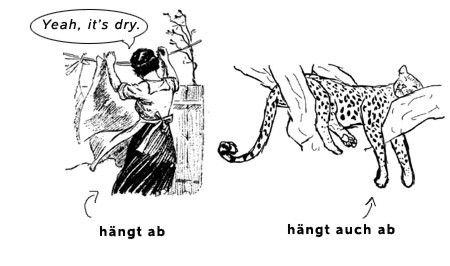abhängen
Ab has two notions that it can add to a verb, separation-ness (we could also call it off-ness) and downward-ness. They can create distinct meanings but in combination with hängen (to hang) they kind of blend together. To hang has both ideas in it anyway. I mean, hanging from the ceiling means not being directly at the ceiling, so there’s the separation and of course you can only hang downward. Well, okay unless you’re in space. There, you can hang allward. Or was it anyward? Oh boy… I think the bs-express just arrived. I really thought I’d lost him.
So anyway, abhängen looks a lot like to hang off. And if you have some experience with German prefix verbs you’ll know that it’s NOT gonna be the translation. The meanings of prefix verbs just aren’t that literal, usually. But abhängen actually is the literal translation of an English word: to depend.
The base of depend is the Latin verb pendere, which is also the base of words like suspend, appendix or pendulum. And now guess what the verb meant… drumroll… it meant to hang. So depend is really the exact same as abhängen… pend (to hang) combined with de (idea of separation).
And the use of the verbs is really pretty similar. Only that you depend ON while you abhängen VON.
- Das hängt ein bisschen vom Wetter ab.
- That depends a little on the weather.
- Das hängt davon ab, wie müde ich bin.
- That depends on how tired I am.
Abhängen is just as useful and common as depend and the same goes for the related words.
- Das Trinkgeld ist von der Servicequalität abhängig.
- The tip is dependent on the quality of service. (literal)
- Das Kino macht immer eine Pause im Film, völlig unabhängig davon, ob es Sinn macht oder nicht.
- The cinema always makes a break, no matter/irrespective of whether it makes sense or not.
- Am 4 Juli feiert die USA Unabhängigkeitstag.
- On the 4th of July the USA celebrates Independence Day.
Cool.
Depend is definitely the most common and most important use of abhängen. But as I mentioned in the beginning, there are 4 meanings in total, so three more to go. Here they are:to lose in sense of losing a pursuer, to take down laundry and to hang around/chill (with friends).
A really random collection of contexts and yet they all make sense. I mean, you hang up your laundry so you can also “hang it off”. And as for losing a pursuer… just think of a trailer. It hangs on your car and follows you everywhere. And when you “abhängen” it, it’ll not be after you anymore.
So, not super logical but I hope you can see the connections.
Examples.
- Wir haben den Verfolger abgehängt.
- We lost the tail.
- Die Serie hat die Konkurrenz abgehängt.
- The show/TV-series has clearly outperformed the competition.
- Maria hängt die Wäsche, die Thomas aufgehängt hat, ab.
- Maria takes down/unhangs the laundry Thomas had hung up.
- Nach der Schule hängen wir immer im Park ab.
- After school we’re always chilling/hanging out in the park.
- Wo wir abhängen hängt vom Wetter ab.
- Where we hang out depends on the weather.
All of them are common in their respective domain but abhängen in sense of hanging out definitely sounds a bit like juvenile slang. So if you tell your kids that you’ll go abhängen with the peeps from the grind.. that won’t come across as authentic as you think.
https://yourdailygerman.com/2016/03/23/abhaengen-abhangig-meaning/

